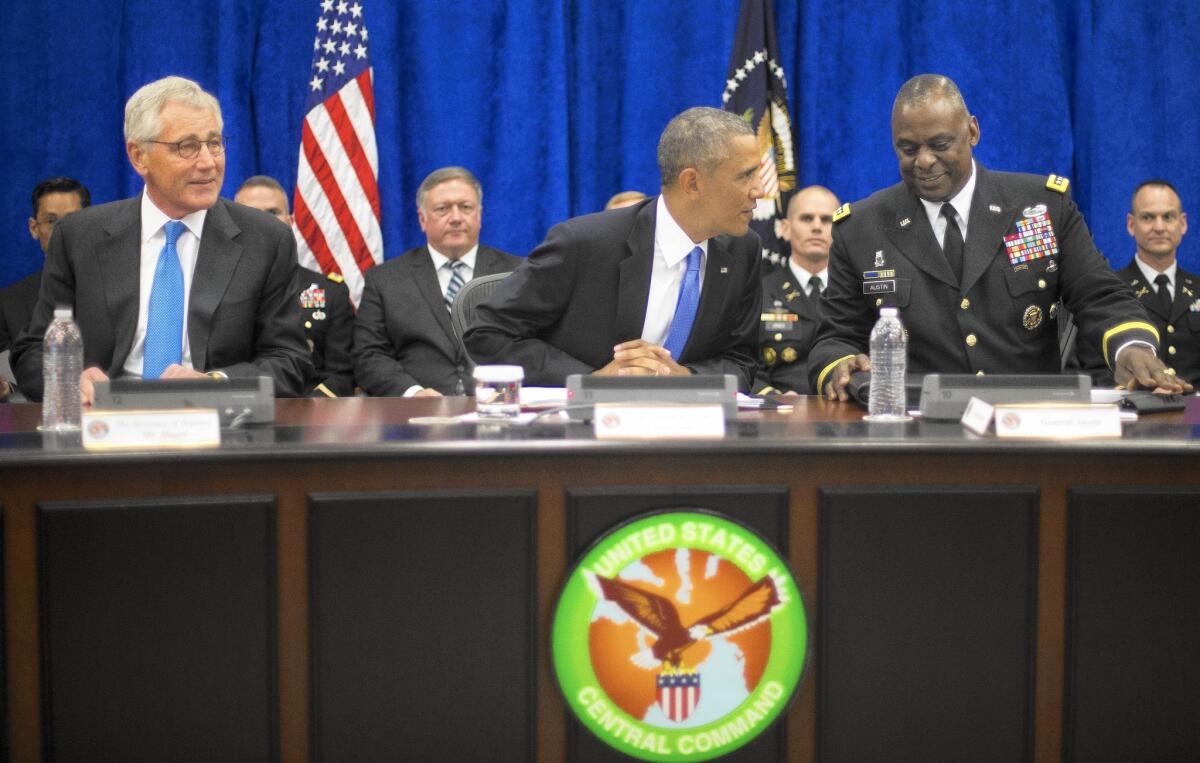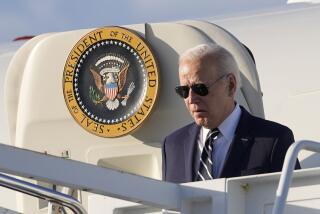Obama faces hurdles at U.N. Security Council meeting

When he heads to the United Nations this week, President Obama will try to rally the world around military operations against Sunni extremists in Iraq, without invoking his predecessor’s similar effort, which failed before the global body 11 years ago.
The setting inevitably brings to mind President George W. Bush’s months-long push to win U.N. backing for U.S. threats to use force against then-Iraqi leader Saddam Hussein. That effort was captured in most Americans’ memories by then-Secretary of State Colin Powell’s famously flawed presentation purportedly showing evidence of Iraqi weapons of mass destruction.
Not surprisingly, Obama administration officials are not expected to bring charts or satellite images to make the case against Islamic State militants. Nor will Obama seek U.N. Security Council authorization for use of force, mindful he would almost surely not get it. Instead, he will arrive at the U.N. after expanding the U.S. bombing campaign into Syria late Monday, according to the Pentagon.
White House officials have been quick to point out the major differences between the two Iraq operations and the campaigns to garner public support for them.
“The president is not contemplating committing 140,000 U.S. military personnel to go on the ground in Iraq,” White House Press Secretary Josh Earnest said Monday. “He does not contemplate columns of tanks rolling across the desert.”
Though the scale and tactics differ, observers still see shades of the Bush experience in Obama’s challenges this week, as well as in the arguments the president will probably use to sway allies.
U.S. officials say Obama hopes to use the U.N. gathering to showcase international support for the mission. Obama will chair a meeting of the Security Council on Wednesday for only the second time and will push the group to adopt a resolution calling for a global crackdown on so-called foreign fighters, who leave their homes to join extremist groups like the one laying siege to large portions of Iraq and Syria.
The resolution calls on member nations to pass laws that punish people who travel across borders to take part in any terrorist acts, and to work with local leaders to fight violent extremism. Administration officials say they believe the measure aimed at an estimated 15,000 foreign fighters, many of them seeking to create an Islamic caliphate in Iraq and Syria, will pass easily.
The resolution will “place new emphasis on the challenge of countering violent extremism in one’s own domestic context, [and] is an important part of the larger challenge,” national security advisor Susan Rice said.
It will also act as a stand-in for a broader endorsement of the U.S.-led campaign: authorization for use of force. Russia almost certainly would veto such an authorization. But without it, legal experts say, Obama, who once vowed to restore respect for international law, will be left cobbling together controversial legal arguments as he expands the air war into Syria, Islamic State’s initial stronghold.
Officials in Baghdad have provided permission for the U.S. to engage in air warfare against Islamic State in northern Iraq. But the White House has said it won’t consult with Syrian President Bashar Assad, whom it wants to see removed from power, before acting in Syria. Furthermore, the administration has said clearly that Islamic State does not pose an imminent threat to the U.S., although it has said it will protect American citizens in Iraq and elsewhere against attack.
Without authorization, consent or an imminent threat, the administration’s legal options are problematic, said Michael Glennon, a professor of international law at Tufts University.
The theory of collective self-defense, which gives outside countries the right to act if asked, was used by President Reagan to justify support for the Contras in Nicaragua but was rejected by an international court, Glennon said. Unless the U.S. can prove that Islamic State is plotting attacks on the U.S. in Syria, “it would be a real stretch to argue collective self-defense,” he said.
Another theory, of hot pursuit, was put forward by Secretary of State John F. Kerry last week.
Glennon noted that rationale’s checkered history: It was first prominently employed by President Nixon to justify bombing in Cambodia against the Viet Cong, he said. It depends on the notion that a government is refusing to control or fight the guerrilla group. That’s a hard argument to make, he said, because the Assad government is fighting Islamic State.
“The whole doctrine is of doubtful validity,” Glennon said. “It’s a hotly disputed doctrine.”
A third option presents other problems, said John Bellinger, a former legal advisor to Bush’s National Security Council. Obama could employ a version of anticipatory self-defense, arguing the U.S. must act to prevent a threat, Bellinger said. It’s a policy the administration has quietly adopted, but making the legal case would undoubtedly draw unwanted comparisons to Bush’s call for preemptive strikes in Iraq, he said.
“That sounds very attractive as a policy … but it seems to be undercut by the statements made by administration officials that the threat is not imminent,” he said. “Furthermore, it sounds a lot like preemption.”
More to Read
Start your day right
Sign up for Essential California for news, features and recommendations from the L.A. Times and beyond in your inbox six days a week.
You may occasionally receive promotional content from the Los Angeles Times.








